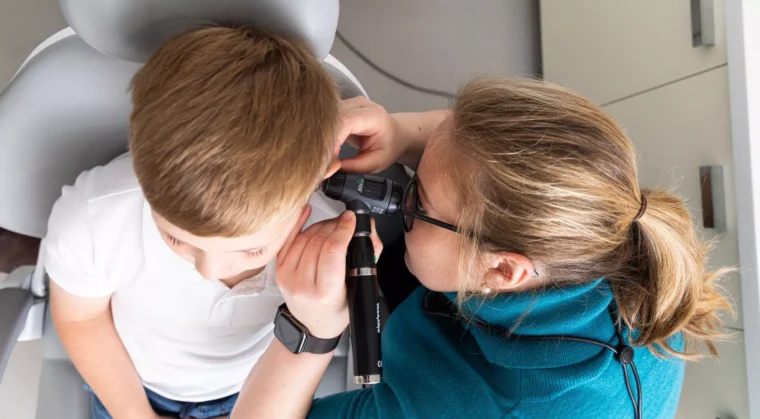Does your child have “glue ear”?
Otitis media with effusion (OME) or “glue ear” is one of the most common illnesses in children. 1 in 5 pre-school children will experience glue ear and 8 out 10 children will have glue ear before age 10.
Glue ear is often temporary and linked to ear infections, however if a child suffers with long-term glue ear it can last for weeks or months and not only affect their hearing, but impact their speech development, learning, and behaviour. Glue ear can affect one of both ears.
What is glue ear?
For our ears to work properly, our middle ear needs to be filled with air. The eustachian tube, which runs from our middle ear to the back of the nose helps to make sure that this happens.
Glue ear occurs when the eustachian tube stops working probably and no longer helps the middle ear to stay filled with air. It occurs more often in children as their eustachian tubes have not fully developed. If the eustachian tubes are blocked or do not open properly changes the air pressure in the middle ear and causing it to fill with fluids.
When the middle ear is blocked, it becomes more difficult for sound to pass through to the inner ear, making certain sounds harder to hear.
What causes glue ear and what are the risk factors?
Glue ear can be a result of a cold and congestion or repeated middle ear infections. Other risk factors for a child developing glue ear include:
≈ Age – especially children under 2 years
≈ If they are bottle fed
≈ Children in day-care from a higher risk of germ exposure
≈ Seasonal allergies
≈ Poor air quality
≈ Exposure to tobacco smoke
About hearing and development
We know that language is learned through exposure to sounds and children pick up and repeat words they hear in their environment. Hearing not only allows your child to develop language skills, but it also influences their learning ability for both reading and writing, Hearing also stimulates them intellectually and plays a significant role in the development of social skills. Hearing loss can result in your child:
Having delayed speech and language skills
Having learning problems at school
Make them feel bad about themselves
Cause them to have trouble making friends
What are the signs of glue ear?
There are not always physical symptoms like pain of fever for glue ear. It is often associated with a heavy cold or other viral infection and will usually clear up when the congestion has gone.


